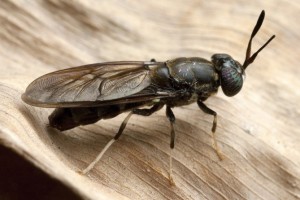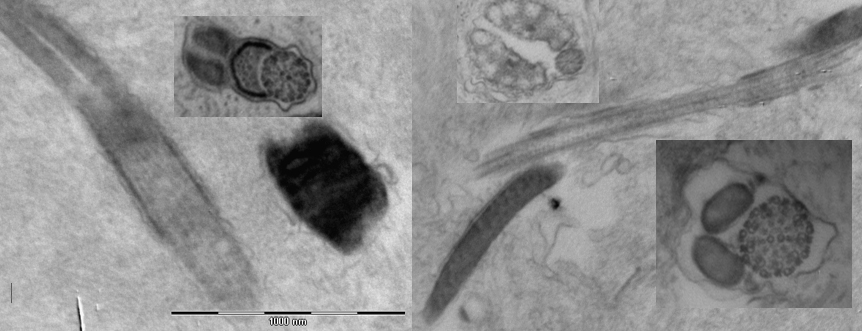The importance of insect sperm: The black soldier fly
The biodiversity and general importance of insects are not generally appreciated. Very few people realize that insects represent about 95% of the Animal Kingdom (AK). In other words all other animal species such as invertebrates including sponges, oysters, mussels, sea urchins, segmented worms, flatworms and vertebrates (fish, amphibians, reptiles, birds and mammals) only comprise 5% of the AK. Insects are accordingly not only much more abundant but also very important in Nature. Many like bees are keystone species. A keystone species, by definition, plays a key and crucial role to greatly affect entire ecosystems, for example, by performing natural behaviours for survival.
The comparative spermatology group at the University of the Western Cape decided to get involved in studying the reproduction with special reference to the sperm of an insect species, the black soldier fly.

Fig.1: Black Soldier fly (Hermetia Illucens)
The black soldier fly (Hermetia Illucens) belongs to the Stratiomyidae family and is a wide spread fly (Fig. 1). Black soldier flies particularly gather around suitable breeding sites, such as organic waste. The life cycle consists of various stages and lasts about 40 days. The length of adults varies between 15-20mm. Mating of black soldier flies occurs in flight and usually when sunlight intensity is highest. Males perform territorial lekking behaviour. Following mating females lay their eggs (up to 700) near decaying organic waste, preferably in a very humid, warm environment. Development of the larvae and pupae also depends on environmental conditions. Adults live for about 5-8 days.
The black soldier fly larvae are known for its environmental and economic importance by playing a beneficial role in some biological processes. It has become extremely important to breed literally tons of these flies of which when dry, the larvae provide excellent protein in animal feed in general and also in aquaculture. Secondly, they are excellent at decomposing food and other organic material to compost, thus playing an important role in waste management and as a result reduce pollution and eliminate pests.
The short life cycle of this species allows frequent reproduction and subsequently long-term production. Therefore, knowledge in the reproductive biology of the black soldier fly is much needed in order to maintain the economic and environment viability of this species. The role of sperm structure and its role in fertilization success are well known, and have been investigated in various insect species. However, research is lacking in terms of the spermatology of the black soldier fly and how it contributes to fertilization success.
Sperm of the black soldier fly can be accessed by dissecting the female sperm storage organs, the spermathecae, and releasing sperm from it. Sperm structure has been investigated so far by fixing spermathecae, and imaged by using transmission electron microscopy (TEM) (Fig. 2).

Fig. 2: Different images of sperm head, sperm flagellar axonemes, mitochondria and mitochondrial derivatives as viewed by transmission electron microscopy.
The typical sperm ground plan, as observed for most other flying insects, has been observed. The black soldier fly sperm seems to have an 18 + 9 + 2 flagellar axoneme. Whether this sperm is motile or immotile has to be confirmed. Sperm head length measurement, based on Hoechst staining of the nuclear DNA and using the Acrosome module of the Sperm Class Analyzer (SCA), is approximately 9 μm. Preliminary studies showed that their sperm also stain with SpermBlue but this needs to be optimized.
We intend to do determine sperm quality including sperm functionality, by using SCA analysis as well as to determine the role, if present, of sperm competition in this species, and how it affects fertilization. We hope to assist through these efforts to select best males for breeding.
Acknowledgement: Agriprotein (Cape Town, Philippi) for assisting and providing black soldier flies for dissection.
Dr Retha Kotze (PhD)
University of the Western Cape
South Africa
Prof Gerhard van der Horst (PhD, PhD)
Senior Consultant
MICROPTIC S.L.



Deja tu comentario